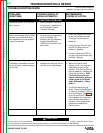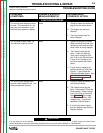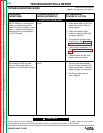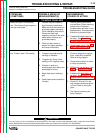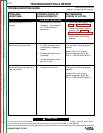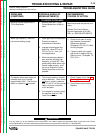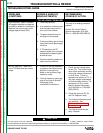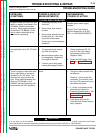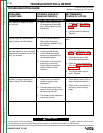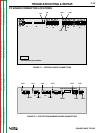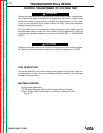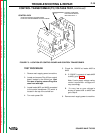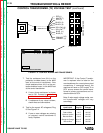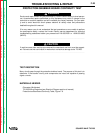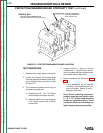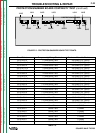
SQUARE WAVE TIG 255
Return to Section TOC Return to Section TOC Return to Section TOC Return to Section TOC
Return to Master TOC Return to Master TOC Return to Master TOC Return to Master TOC
F-15
TROUBLESHOOTING & REPAIR
TROUBLESHOOTING GUIDE
Observe Safety Guidelines
detailed in the beginning of this manual.
PROBLEMS
(SYMPTOMS)
Stick electrode “Blasts Off” when
arc is struck.
Cannot adjust AC Wave Balance
when welding in the Stick Mode.
Machine welds at a very low output
regardless of the preset current set-
ting - arc is stable.
Variable or sluggish welding arc
when welding in the Stick Mode.
POSSIBLE AREAS OF
MISADJUSTMENT(S)
1. Weld current is set too high
for recommended electrode
size. Reduce preset current
adjustment.
1. This is a normal condition.
Wave balance keys are
automatically disabled in the
Stick Mode.
1. If welding in the Remote
Control Mode, the remote
amptrol may be defective or
not installed properly.
2. If the output is low when the
machine is in the Local
Control Mode, the problem
could be internal to the
machine.
1. Check work and electrode
cables for loose or poor
connections.
2. The weld cables may be too
small or too long to permit the
desired current to flow.
3. The preset current adjustment
may be set too low.
RECOMMENDED
COURSE OF ACTION
1. Possible faulty SCR bridge.
See Static and Active SCR
Tests.
2. Control board may be faulty.
Replace.
None
1. Check the SCR bridge. See
Static and Active SCR Tests.
2. Check polarity switch (S2)
connections and operation.
3. Check the control transformer
(T2). See Control Transformer
Voltage Test.
4. The Control board may be
faulty. Replace.
1. Check polarity switch (S2) for
wear or loose connentions.
2. Check interior connections of
the heavy current carrying
leads.
STICK WELDING PROBLEMS
If for any reason you do not understand the test procedures or are unable to perform the tests/repairs safely, contact the Lincoln Electric
Service Department for technical troubleshooting assistance before you proceed call 216-383-2531 or 1-800-833-9353.
CAUTION



